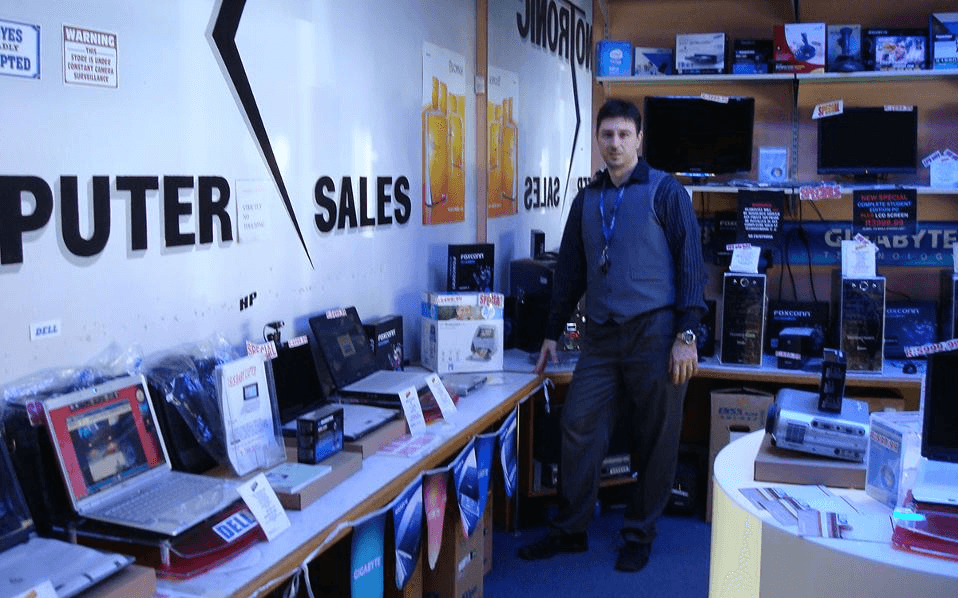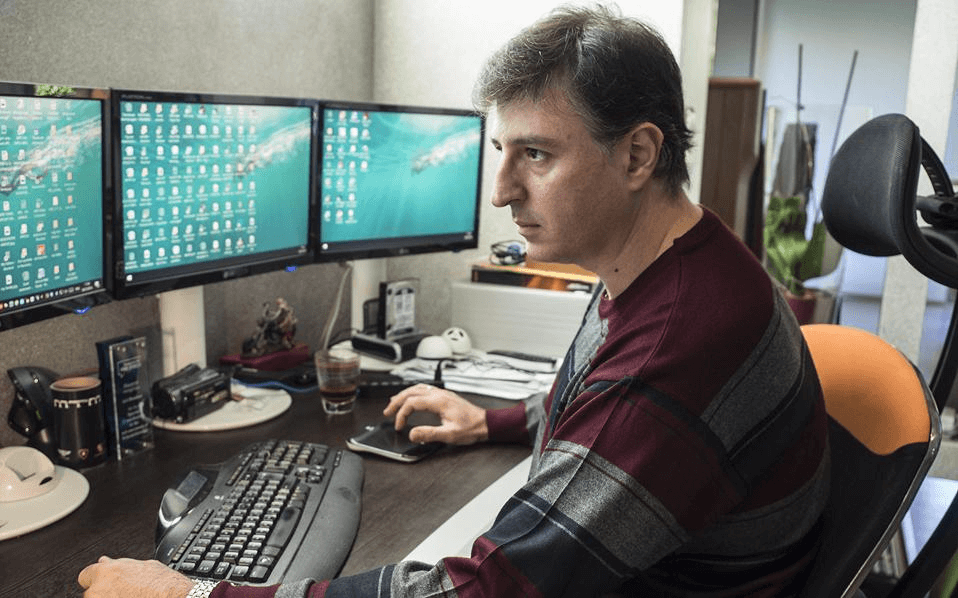Reportage: GIANNIS SOULIOTIS
“We went into the garage, there were seven or eight police officers, all from Durban’s ‘serious and violent crime’ task force. Inside the car was a black man, he was dead and had bullet marks on his body. A few meters away there was another black man, who was struggling with injuries. The police stood around him and mocked him. More than 30 minutes must have passed. One said in Dutch “this dog doesn’t say die” and another suggested “we step on his stomach so he dies faster”. When I asked them “why don’t we call an ambulance?” the chief replied: “They are outside but we told them that the area is not safe yet. If we let the paramedics in, they will take him to the hospital and we will waste taxpayers’ money.” When he finally died, they exclaimed, ‘Finally, he is dead!'”
Aris Danikas, now 46, travelled to South Africa in 1988 to study electronics. Five years later he opened an electrical goods store in Durban. In 1998, he met the commander of the police’s “serious and violent crimes” task force, General Johan Boyson. They became good friends and a year later he decided to join his team as a reserve (volunteer) policeman.

In the years that followed, he became a trusted associate of Boyson, responsible, among other things, for taking photos and videos of scenes of savage crimes. Until 2008 – when he fled South Africa fearing for his life – Aris Danikas had recorded with his camera torture and murder of black people by the group’s police officers. He returned to Greece, changed his phone number and address and uploaded the “controversial” material to the Internet.
Key person
Today, he is a key figure in the South African judiciary’s investigation into the activities of the “death squad” in which he served for nine years. She is under the protection of Amnesty International and last month won one of six whistleblowing awards worldwide from Blueprint for Free Speech. General Boyson and his immediate associates were removed from the corps and face serious charges of forming a criminal organization, homicide and more.
“I didn’t want to leave these people in their place. To decide who lives and who dies, who will be tortured and who will not,” he said in an interview with Kathimerini from a secret location in Greece.

Aris Danikas’ “adventure” in Durban’s “serious and violent crime” task force began in 1999, at the urging of the then powerful local police general Johan Boison.
“It was a closed group of white Dutch speakers, including high-ranking officers, most of them supporters of the old apartheid regime,” he explains. In 2001, during a meeting at a café in Kwazulu-Natal, Boyson showed Danika a picture of a black man, telling him: “If you see him, plant a bullet in his head.”
A few days later, Danika’s team located the suspect in a hut with his wife and children during a night operation. “They dragged him out and handcuffed him behind his back. He was wearing only his underwear and was thrown into the mud. A group of 10 to 12 policemen formed a circle around him and shot him. I tried to get closer, but one of them told me in a strong tone “get out of here”. Later, when I asked what happened, I was told that the suspect tried to pull a gun he had hidden in a creek. Of course, there was no weapon or a river,” he explains.
Three years later, while he had earned the respect and trust of his colleagues (he was awarded for his performance as a volunteer police officer), Danikas secretly filmed with his mobile phone the torture of a black man suspected of robbing a car driver.

“I pretended to talk to my family in Greece. I took three videos with my phone. If they caught me, they would clean me up,” he recalls.
In the videos, officers are seen handcuffed to a chair and beat two men in the chest and legs. Immediately afterwards, they press a piece of skin to the face of one so that they cannot breathe and hold it for a few seconds. When a few months later I decided to show the videos to the general, he laughed and said, ‘This is how we get results.'”
The last and most cruel of the incidents recorded by Danika unfolded on Orthodox Easter Day in 2007. They were partying at his home with the general and their wives when they were warned to go to the garage of a house in the “Indian” district of the city, where there had been an armed fight. Arriving at the scene they found one black man already dead and one seriously injured, while 6-7 police officers of the group were present.
As Danika recounts looking at the shocking video he took from inside the closed parking lot on his computer screen, the police waited more than 30 minutes until the injured man died helplessly, cursing him and calling him a dog. In addition, he claims, they asked him to remove the shell casings from the firearms they had used and moved the body by “planting” a gun in his hand.
“They threatened me and I secretly left for Greece”
In the months that followed, Danika’s relationship with Johan Boyson was disrupted. “He asked me to remove the videos I had collected, and when I asked him to change departments, he refused to sign my transfer.”
Some time later, Danikas remembers receiving threatening messages on his mobile phone and in early 2008 his colleagues visited him at his home and took away his gun and police badge. “I knew I had to leave. It was only a matter of time before an “accident” happened to me. Under the pretext that I was leaving for a short holiday, I secretly went with my wife to Johannesburg and we left South Africa.” After returning to Greece, Danikas changed his home and phone number and in 2009 uploaded the videos to an anonymous YouTube account.
Today, the videos are being used as evidence in South Africa’s ongoing criminal investigation into the activities of this group of police officers, while Boyson and his direct accomplices face felony charges of forming a criminal organization and others.
Danika was visited three times in Athens by South African officials, while recently the 46-year-old former volunteer police officer won an award (from the organization Blueprint for Free Speech) for his contribution to exposing the case.
https://www.kathimerini.gr/investigations/877259/pata-ton-sto-stomachi-na-pethanei-pio-grigora/